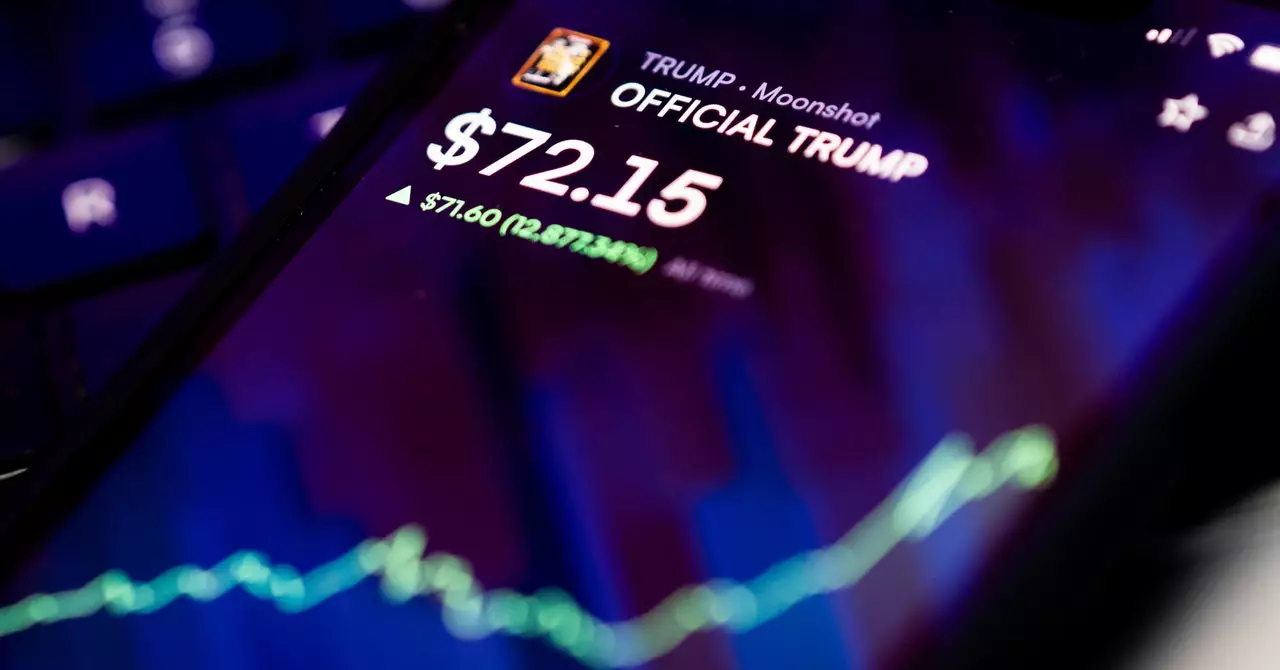The rise of cryptocurrency has brought with it a host of innovative financial products as well as an alarming trend: the emergence of memecoins. These digital currencies often arise from meme culture and social media hype, yet they can execute financial maneuvers that may leave investors vulnerable. Two recent coins, the TRUMP and MELANIA, have ignited conversations about the ethical implications and financial risks associated with this burgeoning sector.
Jacob Silverman, co-author of “Easy Money: Cryptocurrency, Casino Capitalism, and the Golden Age of Fraud,” highlights a troubling aspect of the TRUMP coin’s architecture: its insider distribution, which reportedly holds 80% of the token by its issuers. This disproportion creates a significant risk for masses of investors who purchase the coin, as those in control can lead the coin through speculative marketing, only to sell their holdings and drastically reduce its value. Such tactics, while not always illegal, raise critical ethical questions. Are we witnessing honest entrepreneurship or merely another case of exploitation disguised as innovation?
As Silverman points out, these schemes leave unsuspecting investors “soaked” when the inevitable downturn happens. Losing money is one thing, but the psychological toll of betrayal adds another layer of grievance for those who believe they were participating in a legitimate financial venture.
The launch of the MELANIA coin has further complicated the landscape for TRUMP coin investors. Following the announcement of MELANIA, TRUMP’s valuation plummeted by 50%. This instance exemplifies how competitive dynamics amongst memecoins can adversely affect their value. The relations between these unofficial Trump-themed currencies—like MAGA and Super Trump—highlight a troubling phenomenon wherein supporters of a political figure end up in a financial quagmire due to market volatility directly tied to meme culture.
Steven Steele, the marketing director for MAGA token, expressed his disapproval, labeling the TRUMP token launch as “an egregious money-grab.” This sentiment raises an important discussion surrounding the accountability of prominent figures using their names and influence to launch speculative financial products, especially in the volatile context of cryptocurrencies.
The Risk of Political Influence through Cryptocurrency
The potential implications of memecoins extend beyond mere financial losses. Silverman suggests that such cryptocurrencies could serve as new conduits for bribery, enabling politically motivated actors to exert influence without traditional transactions. By dominating the market value of a coin associated with a political figure, investors might gain leverage over that figure—essentially commodifying political allegiance.
Such revelations signal a dark possibility: the intertwining of cryptocurrency and political ambitions could lead to previously unseen methods of manipulative transactions, complicating the ethics of financial exchanges in politics. The potential for behind-the-scenes deals makes it critical that regulatory frameworks adapt swiftly to these new financial realities.
Interestingly, former President Trump has reversed his stance on cryptocurrency since he initially labeled Bitcoin a “scam” during his first term. As the 2024 presidential campaign unfolds, he has started positioning himself as the “crypto president,” courting the industry’s backing. This metamorphosis indicates a willingness to embrace innovative financial practices as electoral tools. For instance, he has promised to transform the U.S. into the “crypto capital of the planet” should he win re-election.
Accompanying this transformation is the launch of World Liberty Financial, a venture that promises to “make finance great again,” although its specifics remain ambiguous. The inherent skepticism among industry insiders regarding this initiative raises concerns over the sustainability and potential repercussions of these burgeoning projects, including reputational risks for both Trump and his investors if they falter.
Ultimately, the rise of memecoins like TRUMP and MELANIA underscores the urgent need for critical examination in the cryptocurrency realm. While these ventures may seem harmless or even entertaining, they hold a substantial risk for investors who may be swayed by speculative marketing and celebrity endorsement. The intertwining of financial ventures and political maneuvering will necessitate that stakeholders—be they regulators, investors, or the general public—exercise caution. As cryptocurrency continues to evolve, navigating its ethical and financial complexities will be paramount in safeguarding both industries and individuals alike.

